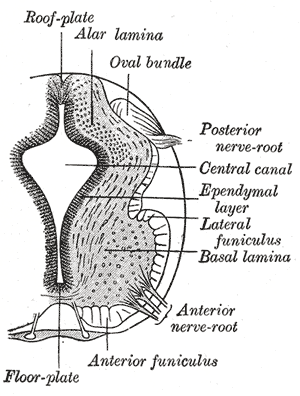Epigenetics of neurodegenerative diseases
Epigenetics of neurodegenerative diseases
The study of the epigenetics of neurodegenerative diseases focuses on how epigenetic mechanisms contribute to the development and progression of diseases that affect the nervous system. These diseases include Alzheimer's disease, Parkinson's disease, Huntington's disease, and Amyotrophic lateral sclerosis (ALS), among others. Epigenetic changes can influence gene expression without altering the underlying DNA sequence, and they include mechanisms such as DNA methylation, histone modification, and non-coding RNAs.
Epigenetic Mechanisms[edit | edit source]
Epigenetic mechanisms play a crucial role in regulating gene expression in the nervous system. The primary mechanisms include:
- DNA methylation: The addition of a methyl group to the DNA molecule, typically at cytosine bases in CpG islands, which can repress gene transcription.
- Histone modification: The addition or removal of chemical groups to histone proteins, affecting how tightly DNA is wound around histones and thus regulating gene accessibility.
- Non-coding RNAs: RNA molecules that do not code for proteins but can regulate gene expression at the transcriptional and post-transcriptional levels.
Alzheimer's Disease[edit | edit source]
Alzheimer's disease (AD) is characterized by the accumulation of amyloid-beta plaques and neurofibrillary tangles in the brain. Epigenetic changes, such as altered DNA methylation and histone modifications, have been observed in genes associated with AD, including those involved in amyloid precursor protein (APP) processing and tau protein regulation.
Parkinson's Disease[edit | edit source]
Parkinson's disease (PD) is marked by the loss of dopaminergic neurons in the substantia nigra. Epigenetic alterations, such as changes in DNA methylation and histone acetylation, have been implicated in the regulation of genes involved in dopamine synthesis, mitochondrial function, and oxidative stress response.
Huntington's Disease[edit | edit source]
Huntington's disease (HD) is caused by a genetic mutation in the HTT gene, leading to the production of an abnormal huntingtin protein. Epigenetic modifications, including histone deacetylation and altered DNA methylation, have been shown to affect the expression of genes involved in neuronal survival and function.
Amyotrophic Lateral Sclerosis[edit | edit source]
Amyotrophic lateral sclerosis (ALS) is a progressive neurodegenerative disease affecting motor neurons. Epigenetic changes, such as DNA methylation and histone modifications, have been observed in genes related to RNA processing, protein homeostasis, and neuroinflammation.
Research and Therapeutic Implications[edit | edit source]
Understanding the epigenetic mechanisms underlying neurodegenerative diseases can provide insights into disease pathogenesis and identify potential therapeutic targets. Epigenetic therapies, such as histone deacetylase inhibitors and DNA methyltransferase inhibitors, are being explored for their potential to modify disease progression.
See Also[edit | edit source]
- Epigenetics
- Neurodegenerative disease
- Alzheimer's disease
- Parkinson's disease
- Huntington's disease
- Amyotrophic lateral sclerosis
References[edit | edit source]
External Links[edit | edit source]
Search WikiMD
Ad.Tired of being Overweight? Try W8MD's physician weight loss program.
Semaglutide (Ozempic / Wegovy and Tirzepatide (Mounjaro / Zepbound) available.
Advertise on WikiMD
|
WikiMD's Wellness Encyclopedia |
| Let Food Be Thy Medicine Medicine Thy Food - Hippocrates |
Translate this page: - East Asian
中文,
日本,
한국어,
South Asian
हिन्दी,
தமிழ்,
తెలుగు,
Urdu,
ಕನ್ನಡ,
Southeast Asian
Indonesian,
Vietnamese,
Thai,
မြန်မာဘာသာ,
বাংলা
European
español,
Deutsch,
français,
Greek,
português do Brasil,
polski,
română,
русский,
Nederlands,
norsk,
svenska,
suomi,
Italian
Middle Eastern & African
عربى,
Turkish,
Persian,
Hebrew,
Afrikaans,
isiZulu,
Kiswahili,
Other
Bulgarian,
Hungarian,
Czech,
Swedish,
മലയാളം,
मराठी,
ਪੰਜਾਬੀ,
ગુજરાતી,
Portuguese,
Ukrainian
Medical Disclaimer: WikiMD is not a substitute for professional medical advice. The information on WikiMD is provided as an information resource only, may be incorrect, outdated or misleading, and is not to be used or relied on for any diagnostic or treatment purposes. Please consult your health care provider before making any healthcare decisions or for guidance about a specific medical condition. WikiMD expressly disclaims responsibility, and shall have no liability, for any damages, loss, injury, or liability whatsoever suffered as a result of your reliance on the information contained in this site. By visiting this site you agree to the foregoing terms and conditions, which may from time to time be changed or supplemented by WikiMD. If you do not agree to the foregoing terms and conditions, you should not enter or use this site. See full disclaimer.
Credits:Most images are courtesy of Wikimedia commons, and templates, categories Wikipedia, licensed under CC BY SA or similar.
Contributors: Prab R. Tumpati, MD






